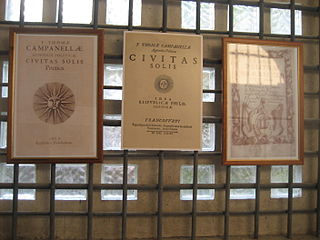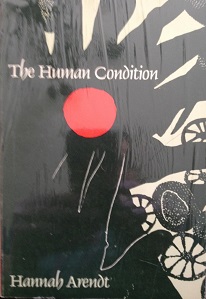Agnosticism is the view or belief that the existence of God, of the divine or the supernatural is unknown or unknowable. Another definition provided is the view that "human reason is incapable of providing sufficient rational grounds to justify either the belief that God exists or the belief that God does not exist."

Bertrand Arthur William Russell, 3rd Earl Russell, was a British mathematician, philosopher, and public intellectual. He had a considerable influence on mathematics, logic, set theory, and various areas of analytic philosophy.

Pragmatism is a philosophical tradition that views language and thought as tools for prediction, problem solving, and action, rather than describing, representing, or mirroring reality. Pragmatists contend that most philosophical topics—such as the nature of knowledge, language, concepts, meaning, belief, and science—are all best viewed in terms of their practical uses and successes.

The City of the Sun is a philosophical work by the Italian Dominican philosopher Tommaso Campanella. It is an important early utopian work. The work was written in Italian in 1602, shortly after Campanella's imprisonment for heresy and sedition. A Latin version was written in 1613–14 and published in Frankfurt in 1623.

Karl Marx's theory of alienation describes the experience of human life as meaningless or the human self as worthless in modern capitalist society. It is Marx's earliest recognizable attempt at a systematic explanatory theory of capitalism.

Dora, Countess Russell was a British author, a feminist and socialist campaigner, and the second wife of the philosopher Bertrand Russell. She was a campaigner for contraception and peace. She worked for the UK-government-funded Moscow newspaper British Ally, and in 1958 she led the "Women's Peace Caravan" across Europe during the Cold War.
Quadragesimo anno is an encyclical issued by Pope Pius XI on 15 May 1931, 40 years after Leo XIII's encyclical Rerum novarum, further developing Catholic social teaching. Unlike Leo XIII, who addressed the condition of workers, Pius XI discusses the ethical implications of the social and economic order. He describes the major dangers for human freedom and dignity arising from unrestrained capitalism, from socialism, and from communism as practised in Russia. He also calls for the reconstruction of the social order based on the principles of solidarity and subsidiarity.

Idleness is a lack of motion or energy. In describing a person, idle suggests having no labor: "idly passing the day".

The Russell–Einstein Manifesto was issued in London on 9 July 1955 by Bertrand Russell in the midst of the Cold War. It highlighted the dangers posed by nuclear weapons and called for world leaders to seek peaceful resolutions to international conflict. The signatories included eleven pre-eminent intellectuals and scientists, including Albert Einstein, who signed it shortly before his death on 18 April 1955. Shortly after the release, philanthropist Cyrus S. Eaton offered to sponsor a conference—called for in the manifesto—in Pugwash, Nova Scotia, Eaton's birthplace. The conference, held in July 1957, became the first of the Pugwash Conferences on Science and World Affairs.

The Bertrand Russell Case, known officially as Kay v. Board of Higher Education, was a case concerning the appointment of Bertrand Russell as Professor of Philosophy of the College of the City of New York, as well as a collection of articles on the aforementioned case, edited by John Dewey and Horace M. Kallen.
The Idler was a series of 103 essays, all but twelve of them by Samuel Johnson, published in the London weekly the Universal Chronicle between 1758 and 1760. It is likely that the Chronicle was published for the sole purpose of including The Idler, since it had produced only one issue before the series began, and ceased publication when it finished. The authors besides Johnson were Thomas Warton, Bennet Langton, and Joshua Reynolds.

Power: A New Social Analysis by Bertrand Russell is a work in social philosophy written by Bertrand Russell. Power, for Russell, is one's ability to achieve goals. In particular, Russell has in mind social power, that is, power over people.

The Human Condition, first published in 1958, is Hannah Arendt's account of how "human activities" should be and have been understood throughout Western history. Arendt is interested in the vita activa as contrasted with the vita contemplativa and concerned that the debate over the relative status of the two has blinded us to important insights about the vita activa and the way in which it has changed since ancient times. She distinguishes three sorts of activity and discusses how they have been affected by changes in Western history.
Some Marxists posit what they deem to be Karl Marx's theory of human nature, which they accord an important place in his critique of capitalism, his conception of communism, and his materialist conception of history. Marx does not refer to human nature as such, but to Gattungswesen, which is generally translated as "species-being" or "species-essence". According to a note from Marx in the Manuscripts of 1844, the term is derived from Ludwig Feuerbach's philosophy, in which it refers both to the nature of each human and of humanity as a whole.

The aspects of Bertrand Russell's views on philosophy cover the changing viewpoints of philosopher and mathematician Bertrand Russell (1872–1970), from his early writings in 1896 until his death in February 1970.

Aspects of philosopher, mathematician and social activist Bertrand Russell's views on society changed over nearly 80 years of prolific writing, beginning with his early work in 1896, until his death in February 1970.

The Need for Roots: prelude towards a declaration of duties towards mankind is a book by Simone Weil. It was first published in French in 1949, titled L'Enracinement. The first English translation was published in 1952. Like all of Weil's books, it was published posthumously.
The socialist mode of production, sometimes referred to as the communist mode of production, or simply (Marxist) socialism or communism as Karl Marx and Friedrich Engels used the terms communism and socialism interchangeably, is a specific historical phase of economic development and its corresponding set of social relations that emerge from capitalism in the schema of historical materialism within Marxist theory. The Marxist definition of socialism is that of production for use-value, therefore the law of value no longer directs economic activity. Marxist production for use is coordinated through conscious economic planning. According to Marx, distribution of products is based on the principle of "to each according to his needs"; Soviet models often distributed products based on the principle of "to each according to his contribution". The social relations of socialism are characterized by the proletariat effectively controlling the means of production, either through cooperative enterprises or by public ownership or private artisanal tools and self-management. Surplus value goes to the working class and hence society as a whole.
The right to rest and leisure is the economic, social and cultural right to adequate time away from work and other societal responsibilities. It is linked to the right to work and historical movements for legal limitations on working hours. Today, the right to rest and leisure is recognised in the Universal Declaration of Human Rights, the International Covenant on Economic, Social and Cultural Rights, the Convention on the Rights of the Child, and in many regional texts such as the African Charter on the Rights and Welfare of the Child.

Critique of work or critique of labour is the critique of, and wish to abolish, work as such, and to critique what the critics of works deem wage slavery.














